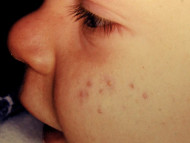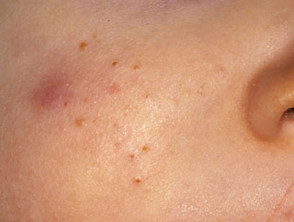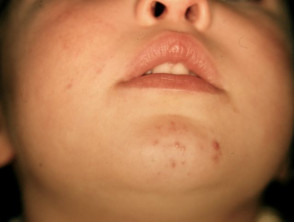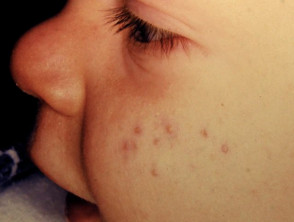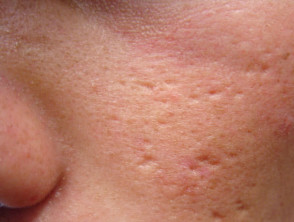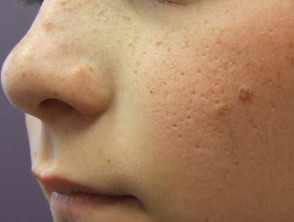What is infantile acne?
True infantile acne generally affects the cheeks, and sometimes the forehead and chin, of children aged six weeks to one year. It is more common in boys and is usually mild to moderate in severity. In most children it settles down within a few months.
The acne may include comedones (whiteheads and blackheads), inflamed papules and pustules, nodules, and cysts. It may result in scarring.
Infantile acne
See more images of acne in young children.
What is the cause of infantile acne?
The cause of infantile acne is unknown. It is thought to be genetic in origin. It is not usually due to excessive testosterone or other androgenic hormones and children with infantile acne are usually otherwise quite normal in appearance.
Acne is rare in older prepubertal children aged 2 to 6. It is associated with higher levels of androgens than is expected for the age of the child. These may result in virilisation. Signs of virilisation are:
- Excessive body hair
- Abnormal growth
- Genital and breast development
- Body odour.
Hormone abnormalities in children with acne may be associated with the following conditions:
- Congenital adrenal hyperplasia
- Cushing syndrome
- 21-Hydroxylase deficiency
- Precocious puberty
- Androgen-secreting tumours
- Medications
- Premature adrenarche (early puberty).
Should any tests be done?
In most babies with acne, no investigations are necessary. In older children, or if there are other signs of virilisation, the following screening tests may be useful.
- Blood tests: DHEAS, testosterone, 17-hydroxyprogesterone, LH, FSH, prolactin
- X-ray: bone age measurement
What is the result of infantile acne?
Severe infantile acne may result in permanent scarring. Individuals with severe infantile acne tend to develop troublesome acne at puberty.
Scarring from infantile acne
What is the treatment for infantile acne?
Treatment of infantile acne is usually with topical agents such as benzoyl peroxide or erythromycin gel.
In severe cases, oral antibiotics such as erythromycin and trimethoprim, or isotretinoin may be required.
NOTE: tetracycline antibiotics should not used in young children because they may cause yellow staining of the developing permanent teeth.
